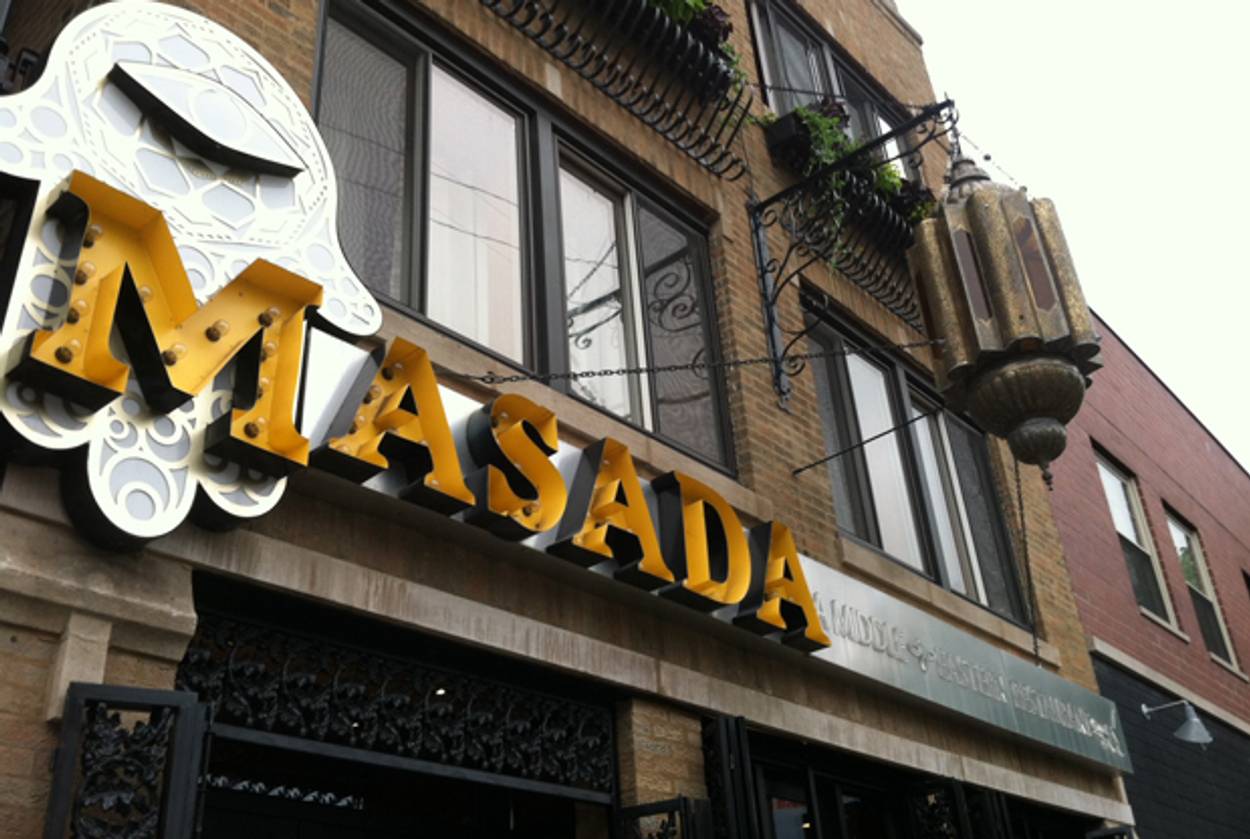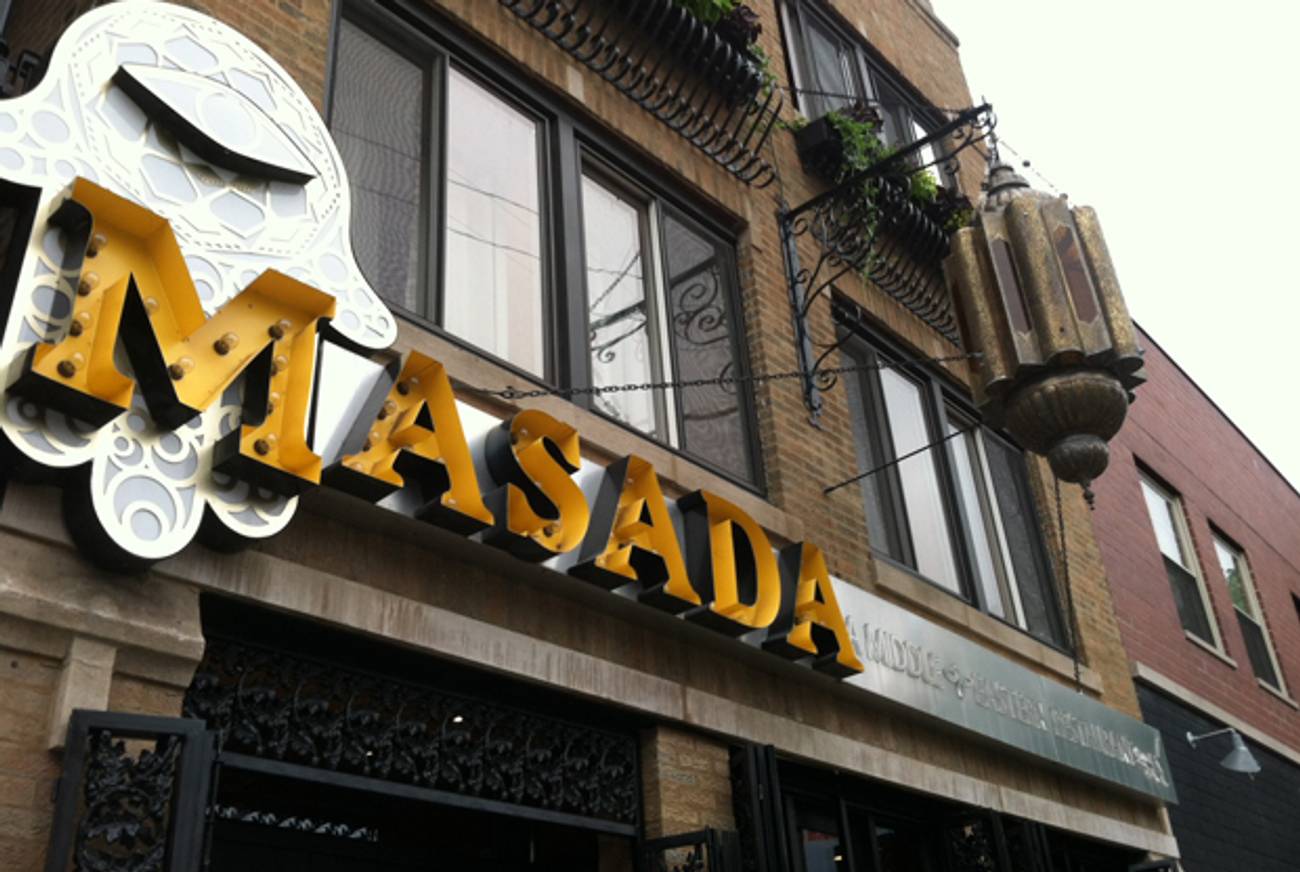Chicago Restaurant Offers Taste of Middle East
Jordan-born chef opens Masada, a nod to the desert fortress and his mom




For Shadi Ramli, owner of the newly opened Masada restaurant in Chicago’s Logan Square neighborhood, the question “Where are you from?” elicits a complicated response.
“I was born in Jordan,” says the 37-year-old restaurateur, “but I could be from anywhere. I could be Greek, Jewish, Italian—I’m probably a little bit of everything.”
Ramli’s new restaurant, which opened at the end of June after being in the works for 10 years, is a reflection of his eclectic background. The name, for example, comes as much from the ancient Israeli fortress as it does from his mother, also named Masada, who brought him and his brother to Chicago from Jordan in 1984, when he was seven years old.
“Masada, in both Hebrew and Arabic, means fortress, or support,” he says. “For the Israelites, support meant protection from Romans. For my mom, it meant being able to raise her kids in a home that was essentially four walls and a bathtub drain.”
But from those humble beginnings sprang Ramli’s remarkable culinary career. In 1990, Ramli’s family opened its first restaurant, Sultan’s Market, in nearby Wicker Park, where it quickly became the go-to falafel spot for neighborhood hipsters and local foodies.
Masada began with a desire to build a bigger, more social Middle Eastern restaurant. Situated just feet from a clattering L-Train stop, its entrance is marked by a shiny silver hamsa and a hanging Turkish lantern, making the restaurant nearly impossible to miss. At nearly 7,000 square feet, spanning two floors and three patios, Masada can feel downright cavernous. Yet somehow, Ramli still managed to imbue every inch of it with Middle Eastern spirit.
There’s also a distinct air of tolerance. Along the walls are photoshopped pictures of American celebrities—Leonard Nimoy, Samuel L. Jackson, Sandra Bullock—wearing keffiyehs and turbans. The photos, says Ramli, are part of an effort to “debunk the idea that Arabs are inherently scary people.”
Ramli takes a similar approach to his menu, a tightly curated collection of some of his favorite dishes from around the Middle East. The lentil soup is garlicky and refreshing; and the koshari, an Egyptian pasta dish with lentils, rice, chickpeas and a zesty tomato sauce, is downright addictive. Ramli attributes the widespread appeal of his veggie dishes to two things: good olive oil and his mother, who trained Masada’s entire kitchen staff. “She can make soup from a rock,” he says. “She’s that good.”
For more carnivorous diners, Masada offers a variety of halal meats in the form of wraps, stews, and kebabs. There’s even a selection of organ meat and offal. “I’ve got a sautéed lamb kidney and heart dish that’s packed with iron. Very good for blood flow.”
The downstairs bar serves up classic American cocktails with a Mediterranean twist. The Bourbon Turban, a black tea infused remix of the whisky sour, is sweet and frothy, but still packs a boozy punch. More popular still is the Moroccan Mojito, a mix of hibiscus-infused rum and mint leaves that, with its bright red and green hue, recalls the colors of the Moroccan flag. Masada also boasts an extensive collection of Arak, the anise-based liquor popular in the Middle East. As far as Ramli knows, it’s the only collection of its kind in Chicago.
It’s Chicago, after all, that makes a restaurant like Masada feel so necessary. Often referred to as “The City of Neighborhoods,” Chicago is the kind of place where geographical boundaries can separate people as viciously as racial and ethnic ones. In that context, Ramli’s restaurant serves a purpose much higher than churning out quality hummus.
“My goal was to create a space where backgrounds, cultures, and allegiances dissolve away,” he says, “and the only thing that matters is being comfortable with who you are.”
Ramli doesn’t just preach that attitude; he lives it.
“When I walk down the street here, people ask me whether I’m a White Sox fan or a Cubs fan,” he says. “You know what I tell them? I’m a Chicago fan.”
Brian Zimmerman is a Chicago-based writer and journalist. He serves as the web content editor for Spertus Institute for Jewish Learning and Leadership and is an MFA candidate at Northwestern University.
Previous: A Vegetarian Food Truck Called Shhmaltz
Related: Israeli Chefs Bring a New Spin on Middle Eastern Food to America
A New York Bakery’s Israeli Roots
Brian Zimmerman is a Chicago-based writer and journalist. He serves as the web content editor for Spertus Institute for Jewish Learning and Leadership and is an MFA candidate at Northwestern University.